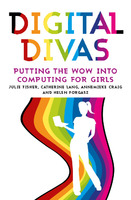Digital Divas
| dc.contributor.author | Fisher, Julie | |
| dc.contributor.author | Lang, Catherine | |
| dc.contributor.author | Craig, Annemieke | |
| dc.contributor.author | Forgasz, Helen | |
| dc.contributor.author | McLeod, Amber | |
| dc.date.accessioned | 2016-12-31 23:55:55 | |
| dc.date.accessioned | 2019-12-02 14:57:45 | |
| dc.date.accessioned | 2020-04-01T14:19:10Z | |
| dc.date.available | 2020-04-01T14:19:10Z | |
| dc.date.issued | 2016 | |
| dc.identifier | 605039 | |
| dc.identifier | OCN: 945783898 | en_US |
| dc.identifier.uri | http://library.oapen.org/handle/20.500.12657/32796 | |
| dc.description.abstract | The geek is male. Or so it seems. As is well documented, there is a distinct under-representation of girls studying computing at high school level and, correspondingly, going on to have careers in IT. To address this problem, in 2007 the authors of this book, with backgrounds in secondary teaching or IT, trialled a new and revolutionary program in schools: ‘Digital Divas’. The Digital Divas program, based on the idea that it was possible to change girls’ perceptions of IT careers with educationally sound materials that tapped into their interests and were delivered in all-girl classes within the school curriculum, was a great success. In 'Digital Divas: Putting the Wow into Computing for Girls', Fisher, Lang, Craig and Forgasz recount what they did and how they did it, and reflect on the significance of this program, which has indisputably led to an increased self-sufficiency with IT amongst girls, challenged stereotypical understandings of IT as a male activity, and increased the pursuit of IT careers by young women. This title was made Open Access by libraries from around the world through Knowledge Unlatched. | |
| dc.language | English | |
| dc.relation.ispartofseries | Education | |
| dc.subject.classification | thema EDItEUR::J Society and Social Sciences::JN Education::JNU Teaching of a specific subject | en_US |
| dc.subject.other | women in information science | |
| dc.subject.other | information technology | |
| dc.subject.other | media and communications | |
| dc.subject.other | computers | |
| dc.subject.other | education | |
| dc.subject.other | study and teaching (secondary) | |
| dc.subject.other | Curriculum | |
| dc.subject.other | Focus group | |
| dc.subject.other | Single-sex education | |
| dc.title | Digital Divas | |
| dc.type | book | |
| oapen.identifier.doi | 10.26530/OAPEN_605039 | |
| oapen.relation.isPublishedBy | ca6f5f25-1581-4668-a187-8ddef959496d | |
| oapen.relation.isFundedBy | b818ba9d-2dd9-4fd7-a364-7f305aef7ee9 | |
| oapen.relation.isbn | 9781922235862 | |
| oapen.collection | Knowledge Unlatched (KU) | |
| oapen.pages | 208 | |
| oapen.place.publication | Clayton | |
| oapen.grant.number | 103466 | |
| oapen.grant.program | KU Round 2 | |
| oapen.redirect | 649986 | |
| oapen.remark.public | Relevant Wikipedia pages: Computing - https://en.wikipedia.org/wiki/Computing; Curriculum - https://en.wikipedia.org/wiki/Curriculum; Educational technology - https://en.wikipedia.org/wiki/Educational_technology; Focus group - https://en.wikipedia.org/wiki/Focus_group; Single-sex education - https://en.wikipedia.org/wiki/Single-sex_education | |
| oapen.identifier.isbn | 9781922235879 | |
| grantor.number | 103466 | |
| oapen.identifier.ocn | 945783898 |

